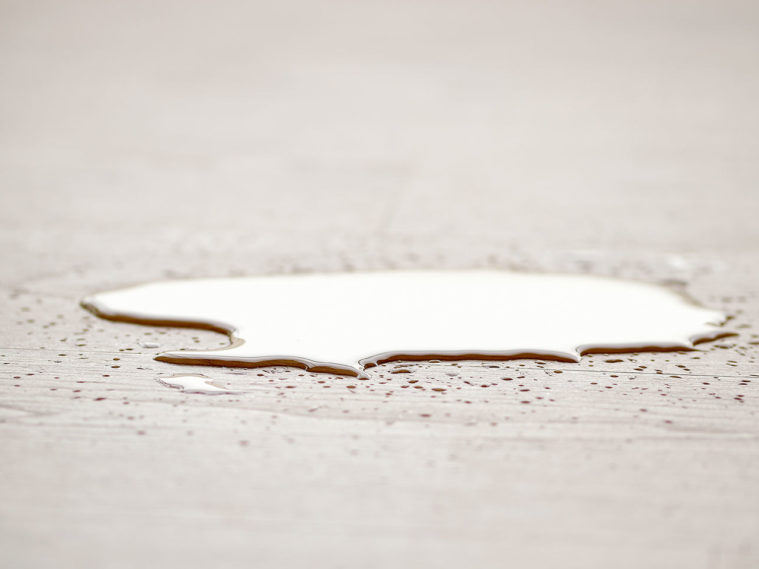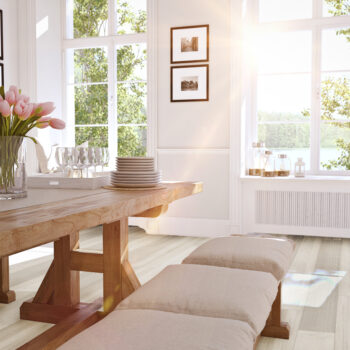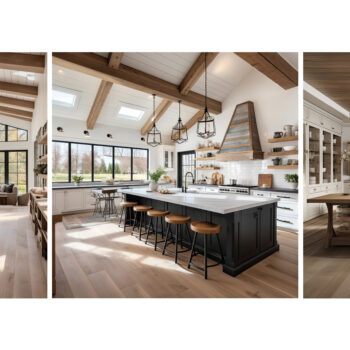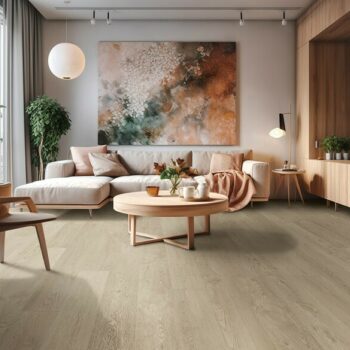
Best Flooring for Snow
ShareIt’s December again! That means your floors are about to be subjected to several months of wet, muddy boots and shoes.
Snow can lead to expense flooring problems if water damage results in accelerated wear and tear and more frequent flooring replacements.
Not all flooring is susceptible to the damages caused by water, sand and salt. Some materials are far more resilient to the effects of snow than others. So which type of flooring is best for your home or property if snow is a concern?
Vinyl Flooring for the Win
Of all the flooring types, vinyl tends to boast the best resistance to water and abrasive damage from grime. More specifically, luxury vinyl sheet flooring. This type of flooring has several important attributes that make it the clear winner. Luxury vinyl’s hard, ultra-durable wear layer is specifically designed to stand up to high traffic of all types. It’s also not a porous or absorbent type of flooring compared with a material like carpet, laminate or wood.
Spills of all types, including pooling water from melting snow-covered boots, can be easily cleaned off vinyl flooring and leave it looking good as new.
Avoid Laminate
Laminate is usually made of recycled hardwood, and if you’re familiar with wood as a material you likely understand how easily it can be damaged by water. Although usually a somewhat affordable flooring material, laminate’s construction makes it ill suited for winter wetness. The material just doesn’t hold up that well to moisture in general, which can cause sections to curl or buckle after prolonged exposure.
The sand and rock salt that is often dragged into residences and businesses during the winter months can also damage thin laminate, which doesn’t weather the abuse as well as other flooring materials.
Runners Up: Ceramic and Hardwood Flooring
Both ceramic and hardwood flooring have attributes that allow them to weather snow, sand, salt and moisture better than laminate but not quite as well as vinyl. Ceramic holds up well against moisture, but the grout lines between tiles are susceptible to abrasive damage and collect dirt easily, which can be an issue during the winter months.
Hardwood also holds up well against snow and abrasive materials – to a point. Hardwood should have a thin layer of polyurethane applied to the surface that protects the wood from moisture and superficial damage. Subjected to enough time, traffic, dirt, sand and salt this layer can and will wear away, leaving the wood vulnerable.
This can be a real problem at the entrance of businesses and homes with hardwood flooring. Any entrance with high traffic coming right in from the snowy, icy and salty outdoors will inevitably be subjected to a lot of abrasive damage that will eventually degrade the protective layer and allow water to penetrate the planks.
What Makes Winter So Hard on Flooring?
There are three main types of damage floors suffer during the winter months – water from melting snow, abrasions from sand and salt and chemical damage from ice melting chemicals.
If a flooring material is particularly absorbent, water, especially water from snow melted with chemicals or rock salt, can cause floor staining. Porous, improperly sealed wood flooring can swell. Thin laminate may curl at the edges if water is allowed to pool.
If you’ve walked through snow or on a sidewalk, driveway or parking lot that’s been salted or covered with sand to increase traction, you will inevitably be dragging some of that salt or sand inside. No matter how many measures you take, whether its mudrooms or door mats or a combination of the two, it’s virtually impossible to completely prevent abrasive materials from making their way into your home or business. These substances essentially act like sandpaper when they’re smashed and grinded against your flooring, which is why hardwood flooring is at a high risk for losing its polyurethane surface layer.
You’d be right to assume sodium chloride, a chemical so potent it corrodes cement, will probably take a toll on our flooring. Even if you have sturdy luxury vinyl flooring, you’ll still want to take preventative measures to minimize the amount of exposure your flooring has to de-icing chemicals like sodium chloride and magnesium chloride.
Get Great Deals on the Best Residential and Commercial Luxury Vinyl Flooring
Metroflor is in the business of luxury vinyl flooring because it is one of the best looking and most durable flooring options available on the market. We want to make sure businesses, homeowners and property owners investing in high-quality flooring can rest easy knowing they’ve got a great product that will last for years to come.
Contact our flooring experts today and browse our vinyl flooring options to learn more.
Read the Latest Style News

Apr 23, 2024
Step into Spring: Revitalize Your Interior Design with Fresh Flooring Choices

Mar 15, 2024
Are There Different Types of Farmhouse Styles?

